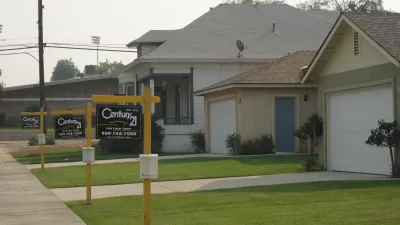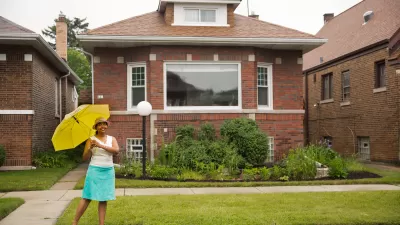Despite the hopes pinned on it, homeownership is still too affected by institutionalized racism at every turn to be an equalizer.

The emotional intensity attached to the idea that homeownership is the best way to build wealth and fix the racial wealth gap can be ferocious. Mechele Dickerson, a professor at the University of Texas at Austin School of Law and author of Homeownership and America’s Financial Underclass: Flawed Premises, Broken Promises, New Prescriptions, recalls many occasions when she faced strong reactions for suggesting that we acknowledge that decades of promoting homeownership hasn’t helped close the racial wealth gap. She recalls being "ripped to shreds" at one event in North Carolina that was full of homeownership advocates, and "literally snarled at" through an hourlong speech at an alumni event. "I didn’t like to give talks over lunch because somebody can be hurling a tomato or a knife or something," she jokes.
When we talk about asset-building, homeownership is typically assumed to be the primary means of achieving it. Over and over we hear (including in the pages of Shelterforce), "Homeownership is the best way to build wealth," as if it is a universal truth. And the conclusion that usually follows hard on that assumption is that closing the racial homeownership gap will therefore close the racial wealth gap—or at least make big strides in that direction.
Often this perspective is promoted by well-meaning people with privilege for whom homeownership did result in a large increase in wealth. Or by those looking at the results for white homeowners whose intergenerational home-equity journey benefited from government support and opportunity hoarding in the mid-20th century. Or by people of color, who, by seeking homeownership are (understandably and rightfully) seeking self-determination and access to something to which they have been wrongfully denied, and are hoping it will fix other problems, like the wealth gap, as well.
Reality is a little more complicated. It’s obviously true that many people who have bought homes end up with more wealth than they had before they purchased their house.
But we shouldn’t assume that because homeownership has been correlated with a significant increase in wealth for white households that the same level of homeownership will produce even the same levels of return for Black households, let alone allow them to catch up. That skips over a lot of things about how both housing markets and structural racism work.
Is Homeownership the Wealth Gap Driver?
"The word 'drive' suggests a causal link between homeownership/home equity and intergenerational wealth," write seven leading scholars on racial equity in the report What We Get Wrong About Closing the Racial Wealth Gap. "However, a major flaw in this reasoning is that, by definition, homeownership/home equity is a component of wealth. ....
FULL STORY: Increased Homeownership Won’t Close the Racial Wealth Gap

Study: Maui’s Plan to Convert Vacation Rentals to Long-Term Housing Could Cause Nearly $1 Billion Economic Loss
The plan would reduce visitor accommodation by 25,% resulting in 1,900 jobs lost.

North Texas Transit Leaders Tout Benefits of TOD for Growing Region
At a summit focused on transit-oriented development, policymakers discussed how North Texas’ expanded light rail system can serve as a tool for economic growth.

Using Old Oil and Gas Wells for Green Energy Storage
Penn State researchers have found that repurposing abandoned oil and gas wells for geothermal-assisted compressed-air energy storage can boost efficiency, reduce environmental risks, and support clean energy and job transitions.

Private Donations Propel Early Restoration of Palisades Playground
Los Angeles has secured over $1.3 million in private funding to restore the Pacific Palisades playground months ahead of schedule, creating a modern, accessible space that supports community healing after recent wildfires.

From Blight to Benefit: Early Results From California’s Equitable Cleanup Program
The Equitable Community Revitalization Grant (ECRG) program is reshaping brownfield redevelopment by prioritizing projects in low-income and environmental justice communities, emphasizing equity, transparency, and community benefits.

Planting Relief: Tackling Las Vegas Heat One Tree at a Time
Nevada Plants, a Las Vegas-based nonprofit, is combating the city’s extreme urban heat by giving away trees to residents in underserved neighborhoods, promoting shade, sustainability, and community health.
Urban Design for Planners 1: Software Tools
This six-course series explores essential urban design concepts using open source software and equips planners with the tools they need to participate fully in the urban design process.
Planning for Universal Design
Learn the tools for implementing Universal Design in planning regulations.
Ascent Environmental
Borough of Carlisle
Institute for Housing and Urban Development Studies (IHS)
City of Grandview
Harvard GSD Executive Education
Toledo-Lucas County Plan Commissions
Salt Lake City
NYU Wagner Graduate School of Public Service





























